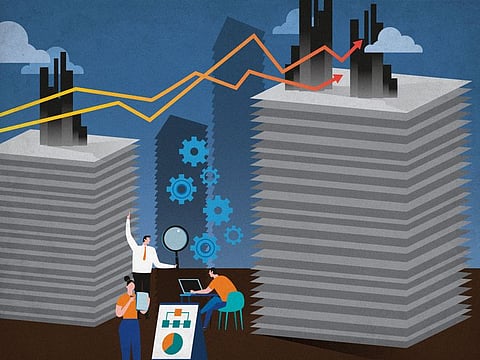There is no need to get creative with data
UAE businesses will be immediate beneficiaries by having access to details

We have a problem with data. Despite being awash in it, the signals that we are receiving from it are adding to the fog of uncertainty, rather than the clarity we all so desperately need.
In the post-COVID-19 world, the value that can be gleaned from the quality and quantity of data is now of paramount importance.
From the rise and fall of small businesses to real estate transactions and the composition of service fees, to banking charges across platforms, to health stats, we are bound by the data that we possess, even though it is being generated at enormously high levels. Part of the problem lies in its usability and the fact that the vast majority of datasets that are available - when they are at all - are either unstructured or in an arcane or proprietary format.
This limits the ability for effective analysis to be conducted by independent third-parties, and therefore undermines confidence.
Victim of interpretation
A further issue is the disproportionate responsibility that lies with those who possess the data. When these datasets are used to spin false narratives, then it is effectively rendered useless. This can be easily resolved by having a set of common minimum standards that are in line with Dubai and the UAE’s lofty values for achieving pioneering smart city status.
Real estate again comes to mind here, where reams of forms are filled out by buyers, sellers and brokers... and yet what appears in its final form as data output leaves the consumer in a state of confusion regarding the state and direction of the market. In banks, voluminous information is shared at the time of account opening, and yet serves no utility when it comes to processing requests by small businesses struggling to stay afloat.
If SMEs are an integral part of Dubai’s economy, then datasets that showed the number of businesses that have reduced employment, closed operations, received funding, or in need of reorganization would serve as early warning signals for both the government and the private sector as they make investment decisions.
Problem of many parts
If real estate forms a critical element, the data collection on how much fees have been reduced, rent reductions across sectors, occupancy rates, service charges would be part of an ecosystem that would aid the entire ecosystem at large, rather than balkanized bits of information that give conflicting signals.
Trust and truth lie at the foundation of UAE’s economy, and it is through data streams this can be enhanced – or damaged depending on data ethics and how it is used. This is a worldwide problem to be sure, but in Dubai, the use of data to rebuild anew is critical especially as industries move increasingly towards the online space.
Common minimum
How do we achieve this? Apart from establishing common reporting standards that remove the “proprietary” usage of data that rightly belongs in the public domain, the obvious initiative would be to increase the level of research at the university/government and the private sector level. Incrementally, the dissemination of data is of a higher standard.
The private sector (especially in areas such as real estate, homeowners association services and banking) have a responsibility to be less cavalier and recognize that their actions have broad consequences. Especially as narratives are filled with counterfactual statements and subjunctive history.
This is not the time to be tendentious; in point of fact, this is the time to converge on objectives that lifts all boats. New sets of data - from utility costs to loan and service charges to relief measures being announced - do not have much meaning unless the effects of these are seen and implemented at the individual levels such that the data sets show the efficacy of these policies.
The ridiculously enormous amounts of data that is being generated comes to naught if we are not aware of its implications and instead being subject to data points that are devoid of meaning.
Soren Kirkegaard stated that “reality is a question of perspective; the further you get from the past, the more concrete and plausible it seems. But as you approach the present, it inevitably seems more incredible and unbelievable”.
His was a world where data accumulation was a painfully low and arduous task. Today, data is the fuel that runs our economies, indeed our lives. It is our collective responsibility to rise with the task in the weeks and months ahead. I hope we pass this test.

- Sameer Lakhani is Managing Director at Global Capital Partners.
Sign up for the Daily Briefing
Get the latest news and updates straight to your inbox








